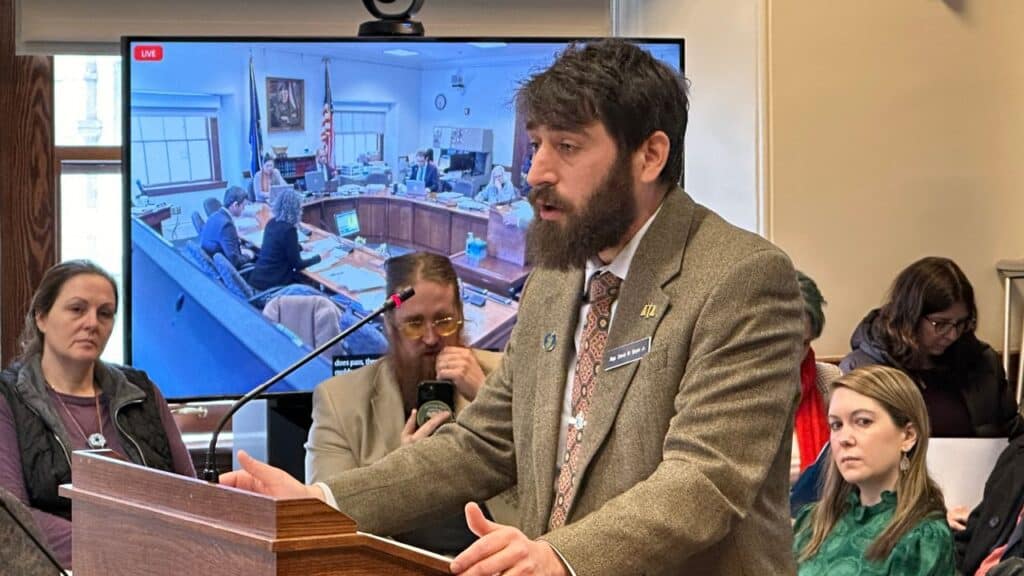In the shadow of the pine-clad hills, a burgeoning debate is unfolding, one with implications that stretch far beyond the coast of the Pine Tree State. In the heart of Maine, lawmakers are embroiled in discussions that would carve out a new space in the cannabis industry—literally.
We’re talking about on-site consumption, an increasingly hot topic in a nation where green is fast becoming the new gold. As the aroma of legalization wafts across the country, there’s no better time to unpack the proposal for Maine to open the doors to cannabis social clubs.

A Quest for Inclusivity: On-Site Cannabis Spaces
At its core, Maine’s initiative echoes a broader movement within the cannabis conversation—a push for inclusivity and normalization. It stands as a promising chapter in the narrative of American legalization, which isn’t just about permitting consumption but also about providing safe and accessible spaces for it.
Think of it as being akin to the revolution of brewpubs during the craft beer renaissance: a controlled environment conducive to a pleasurable and educational experience, combined with responsible consumption.
With a spotlight on cannabis, Maine seems to be taking notes from its trailblazing neighbors. Massachusetts, New York, and Maryland—these states have woven on-site cannabis into their regulatory fabric. They’re not just examples; they’re trailblazers, challenging preconceived notions of what’s possible and acceptable. It’s a case of regional hubris not to look at these states’ experiences as guideposts to navigate Maine’s legislative journey in on-site consumption.
Legalization isn’t just about personal rights; it’s about business potential. Maine isn’t simply proposing the legalization of on-site consumption; it’s laying the groundwork for a new sector of the cannabis economy as first reported by Spectrum News.
Imagine the cafes, the lounges, the quiet nooks where enthusiasts can gather, safely and legally. This isn’t just about tax revenue (though that is an undeniable benefit). It’s about fostering a sense of community and entrepreneurship, all with a plant at its center.
The Heart of the Bill: LD 1952 in the Limelight
Let’s zero in on the bill itself, LD 1952. Sponsored by Rep. David Boyer, its ambition is clear: to create a structured and legal framework for on-site cannabis use. Businesses would need to secure a “cannabis hospitality establishment license” to serve as community spaces for cannabis enthusiasts. The bill prioritizes safety, with provisions for employee training to recognize and manage impairment, similar to those in alcohol-serving establishments.
“It would provide a controlled and regulated environment for adults similar to a brew pub that allows you try different beers and then take some home,” he told members of the Legislature’s Veterans and Legal Affairs Committee. “This would help ensure public safety and reduce the likelihood of public cannabis consumption in inappropriate places.”
While proponents exude confidence in the bill’s capacity to regulate, skeptics raise the specter of impaired driving. This is an issue that continues to vex states at the vanguard of legalization. Maine’s bill, like those before it, does not have a silver bullet for roadside tests of cannabis-induced impairment.
Sen. Jeff Timberlake (R-Turner) questioned Boyer on how law enforcement will be able to test drivers for impairment, noting that there’s no technology currently available to test for cannabis over consumption.
Boyer said police officers could use field sobriety tests — requiring someone to walk a straight line or follow a pen with their eyes — to judge whether someone is safe to drive. And he said regardless of whether there are designated places for people to use cannabis, many people are already consuming it.
Until technology catches up, the worry of increased risk on the roads remains a potent argument against on-site consumption.
The bill dances a tightrope between public health and personal liberty. Critics, including the Director of Maine’s cannabis office, fret about the air quality inside cannabis establishments and the potential for overconsumption. Their concerns, whether pragmatic or precautionary, feed into a narrative of societal responsibility that legalization inherently necessitates.
“This bill simply does not address the serious public health and safety issues raised by permitting the public consumption of a substance that impairs critical thinking, memory, judgment, balance and coordination,” said John Hudak, director of the state’s cannabis office.
We reached out to our friend Derek Shirley a Maine resident and cannabis advocate for his thoughts on consumption lounges in Maine.
“Of course, I am for public consumption/lounges, but why do we need the government to tell us where were are allowed to consume cannabis? especially as a patient. you can take other medicine anywhere you want without stigma and judgement. Why can’t cannabis be the same? Further, we get into legalization further we get away from cannabis is medicine first and foremost. Since it seems social clubs/lounges largest hurdle to policy is “impaired” driving it is important lawmakers understand people can get medicated with cannabis and can drive, while others might be impaired.”
Cannabis Clubs and Community: A Long-Term Partnership?
A particularly poignant aspect of the bill is its potential to weave cannabis more tightly into the fabric of social life. Proponents argue that cannabis clubs could mimic the role many bars and pubs play in fostering social connections, enjoyment, and yes, sometimes overindulgence. But here’s the crux: if Maine were to pave the way for cannabis to be woven into community life, it must also lay down the expectations and infrastructure for responsible consumption.

The idea isn’t just to give users a place to light up; it’s to create an environment that’s educational, controlled, and conducive to responsible use. Education and outreach must march lockstep with the bill’s implementation, ensuring that patrons and staff alike understand the implications of cannabis use.
At the heart of this issue is the very real problem that not everyone has a legal space to consume. Renters, tourists, and those without private accommodation can find themselves on the wrong side of the law simply by partaking in a legal substance. Maine’s bill seeks to rectify this legal gap, providing a safe harbor for those who currently find themselves adrift.
Speaking of Symbiosis
What does this all mean for the future of Maine and, by extension, the national conversation on cannabis? It’s a dialogue, one that speaks to the evolving dynamics of law, industry, and public consciousness. The push for on-site consumption in Maine isn’t just about Maine. It’s about creating precedents, dismantling stereotypes, and sculpting a society where cannabis isn’t just everywhere—it’s ordinary.
As Maine legislature mulls over LD 1952, it’s clear that the journey towards cannabis inclusivity is far from over. Each step—each bill, each law—redefines the contours of what it means to fully integrate cannabis into the social and economic milieu. But it’s more than just a legislative exercise; it’s a societal experiment, and one in which Maine could be a pivotal participant.
As the bill navigates through the legislative channels, the voices on either side of the debate will find their platform. This is democracy in practice, a testament to the evolving nature of public policy. What’s clear is that Maine’s journey is one of regulation, not restriction; of opening spaces, not exploiting loopholes.
No matter which way the vote swings, the takeaway from Maine’s foray into on-site cannabis consumption is the same: the cannabis industry is akin to the plant it celebrates, ever-growing, ever-adapting. As we witness the unfolding saga, one thing remains certain—each legislative development is but a verse in a much larger opus, one that is still being composed.
It isn’t just a bill; it’s a window into a state’s evolving relationship with a plant that has shaped culture, industry, and public policy. So, as we watch Maine grapple with the threads of this issue, we stand on the cusp of what could be a turning point in the nationwide conversation on cannabis.
Keep updated on all the latest news and updates in the Cannabis industry here at Beard Bros Pharms by signing up for our Friday Sesh Newsletter here. Always Dank and Never Spam!
- Can CBD Help Combat Alcohol Binge Drinking? A Study Suggests It Might
- Missouri Hemp Farmers Form Missourians for a Single Market in Attempt to Redefine Regulations
- Restaurant Spotlight: 1811 in Berlin – Timeless Taste in Charlottenburg
- Texas Governor Abbott Vetos Senate Bill 3, Calls For Special Legislative Session
- Petition Calls on Meta to End Cannabis, Psychedelic, and Harm Reduction Communities Censorship
- Texas Expands Medical Cannabis Access with House Bill 46















